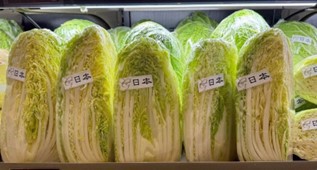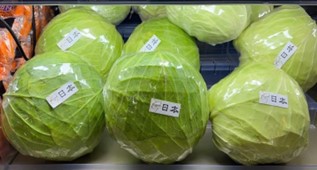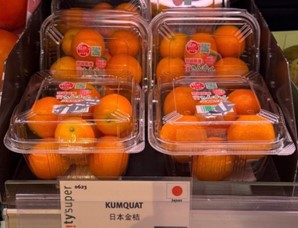FKII newsletter vol.9(Date 12/13/2024)
◆Contents◆
1.Attitudes towards Japanese vegetables and fruit among Hong Kong residents
----------------------------------------------------
1.Attitudes towards Japanese vegetables and fruit among Hong Kong residents
----------------------------------------------------
Basic information about agriculture in Hong Kong
Hong Kong imports food from all over the world, with an emphasis on agricultural products from mainland China. Although agricultural production in Hong Kong is limited, it was one of the main industries from the opening of the port until the early 20th century. However, from the 1970s, with the rapid development of Hong Kong's economy, the number of farms and arable land declined dramatically.
According to a report by the Hong Kong government, the value of Hong Kong's agricultural production in 2022 was HK$1.351bn (breakdown: HK$414m for agricultural products, HK$518m for livestock and HK$419m for poultry), with an average daily production of 41 tonnes of vegetables, 10,800 chickens and 330 pigs. Vegetables produced by Hong Kong farmers account for 1.9% of the total daily consumption in the territory. While locally produced agricultural products are insufficient to replace the share of products from other countries, they provide consumers an additional option.
The perception of Japanese vegetables and fruit
We surveyed 53 men and women aged 20 and over about their perception of, willingness to buy and awareness of Japanese vegetables and fruit. Firstly, when asked about their perception of Japanese vegetables and fruit, 90.6% said they were of high quality and 26.4% said they were safe to eat because they were grown with little or no pesticides. What's more, 14 people answered that they were both, indicating that they have a positive impression of Japanese vegetables and fruit. On the other hand, 37 people said that the prices were a little too high, representing 70% of the total. Compared to vegetables from China and other countries, we found that the price perception of Japanese vegetables and fruit is high.
Frequently purchased Japanese vegetables
When we asked people which Japanese vegetables they buy most often, sweet potatoes were the most popular. Of the 53 people surveyed, 31 (58.5%) often buy them. Looking at the figures by gender, 42% of male respondents and 58% of female respondents said they often bought sweet potatoes, indicating that women are particularly inclined toward purchasing them. The reason for this is that sweet potatoes are highly nutritious and are thought to help reduce and prevent swelling, beautify the skin and prevent constipation by stimulating the bowels with fibre.
The second most popular vegetable is cabbage. Of the 53 people, 20 (37.7%) said they often buy Japanese cabbage. Compared to cabbage from other countries, Japanese cabbage is slightly more expensive, but its leaves are soft and sweet, and it can be eaten raw or cooked, making it popular with consumers who are particular about their food.
The next most popular vegetables are daikon (35.8%) and Chinese cabbage (34%). Both are used as ingredients in hot pot dishes. Hong Kong residents love hot pot, and there are 1,043 hot pot restaurants registered on the restaurant review site OpenRice, which shows just how much they enjoy this cuisine. For this reason, vegetables that are likely to be used in hot pot dishes are popular. Other popular vegetables include tomatoes, pumpkins, spring onions and yams.
Incidentally, of the 53 people who responded to the questionnaire, one said that they would not buy vegetables if they were produced in Japan. This is because they were worried about radioactive materials and concerned that the water used to grow the vegetables may be contaminated.


The perception of Japanese citrus fruits
In recent years, various health crazes have swept the globe, and the impact of the novel coronavirus has caused a significant change in the health awareness of Hong Kong residents, leading to a gradual increase in their interest in health.
Among fruits, citrus fruits are particularly popular and, according to the Second Hong Kong Population-based Food Consumption Survey published in 2022 by the Hong Kong Centre for Food Safety, citrus fruits account for one-third of total daily fruit consumption and are widely enjoyed by consumers.
On a related note, Japanese citrus fruits are also sold in Hong Kong, the most common being mandarins, especially unshu mikan. The thin skin of the unshu mikan makes it easy to peel and eat, and it can be found in upmarket supermarkets as well as local markets.

For example, according to one survey, 51% of people in Hong Kong have heard of Japanese kumquats and have even eaten them. In addition, 22.6% of Hong Kong residents have heard of them but have never tried them. Surprisingly, Japanese kumquats are well known.When asked if they would like to buy Japanese kumquats in the future, 36 people said yes and 17 said no. When we also asked people in Hong Kong who said they would buy Japanese kumquats, 56.4% of consumers said they would buy for both home consumption and as a gift. On the other hand, 41% of Hong Kong residents said they would buy for home consumption.
At present, most places
where you can buy Japanese kumquats in Hong Kong are upmarket supermarkets, but you can also buy them at some local supermarkets and markets.
When we also asked Hong Kong residents who were interested in Japanese kumquats what they considered important when buying them, 31 people (79.5%) answered the 'place of production'. I think that people are naturally concerned about where the food they eat comes from. From the point of view of ordinary Hong Kong residents, Japanese fruit is expensive but has a good reputation for quality, so they can eat it with confidence. Incidentally, as long as the 'place of production' is Japan, I don't think they care too much about whether it's actually from Miyazaki or Kagoshima prefecture. After 'place of production', 'price' was the most important consideration for 23 people (59%) in Hong Kong when buying kumquats. Japanese kumquats are certainly of high quality and safe to eat, but if they are too expensive, you may end up buying them from other countries or buying other fruit instead.
Summary
It's easy to buy Japanese agricultural, forestry and marine products in Hong Kong. Also, from the point of view of Hong Kong residents, Japanese food products are of high quality and have a safe and reliable reputation, so there is little resistance to buying them on a regular basis.
However, compared to vegetables and fruit from China and other countries, Japanese vegetables and fruit are a little more expensive, so they may be out of reach for some consumers. If the price could be reduced a little, I think it would increase their desire to buy.
* This article is an excerpt from a report previously distributed by JFOODO.
〇 A message from JFOODO to all FKII members
The Japan Food Product Overseas Promotion Center (JFOODO) was established within the Japan External Trade Organization (JETRO) as an organisation that handles nationwide consumer promotion of Japanese agricultural, forestry and marine products and foods.
In addition to Hong Kong, JFOODO has overseas field marketers in six cities: the US (New York and Los Angeles), France (Paris), Taiwan and China (Shanghai). Overseas field marketers provide support for JFOODO promotions as well as local information.
The report and video are available on the following page. We hope you find them useful.
https://www.jetro.go.jp/jfoodo/archive/fm_report.html
〇 Contact us
For information about promotions run by JFOODO, please contact the following:
https://www.jetro.go.jp/jfoodo/
Tel: 03-3582-8345
E-mail: JFB@jetro.go.jp
For information on procedures for exporting agricultural, forestry and marine products and foods, overseas systems and regulations, market information and JETRO projects, please contact the following:
HP: https://www.jetro.go.jp/agriportal.html
Tel: 03-3582-5646 (Opening Hours: Weekdays 9am-noon / 1pm-5pm (except public holidays and New Year's holidays)
* You can also contact your nearest JETRO office. (https://www.jetro.go.jp/jetro/japan/list.html)
----------------------------------------------------
Please visit the website of Field for knowledge Integration and Innovation (FKII) The Council of Industry-Academia-Government Collaboration.
https://www.knowledge.maff.go.jp/en/fkii.html
If you would like to inquire, publish your projects or unsubscribe from this e-mail newsletter, please contact us here.
Secretariat of Council of Industry-Academia-Government Collaboration
PwC Consulting LLC
E-mail:jp_cons_fkii_jimu@pwc.com
PLEASE DO NOT REPLY to noreply@fkii-jimu.com
----------------------------------------------------